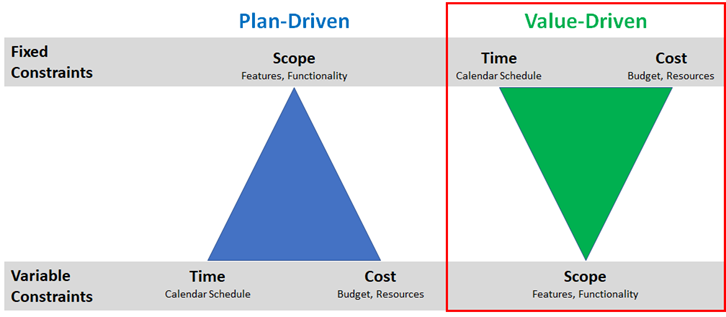Project Management Constraints: A Value-Driven Perspective
Let’s take a fresh look at managing the triple constraints of a project: Time, Scope, Cost. These constraints are sometimes depicted as the iron triangle.
The premise behind this model is that the constraints are not mutually exclusive. Changing one constraint will invariably affect the others.

For example, if scope is increased the time and/or cost to deliver will increase. Conversely, if scope is decreased the time and/or cost to deliver will decrease. But rather than look at these constraints as immovable objects, we can turn the model upside down and use them to drive value.
There are two primary approaches to managing constraints: Plan-driven and Value-driven:
- Plan-driven: Scope is fixed. “How much time and budget will it take to deliver this scope?”

While not always the case, the Plan-driven approach is more aligned with Waterfall delivery, whereas the Value-driven approach is more conducive to Agile delivery.
In an environment where resources are limited, the Value-driven approach makes a lot of sense.
Related Blogs
The Future of Remote Work: Hybrid schedules prove a win-win for employee-employer relationships
Studies show 100% remote work is not what the majority of employees prefer. In fact, recent studies show that the conversation about remote work is spurred more by changing economic demands rather than social demands. In this blog, we look at the changing trends and what that means for the future of remote work.
Diversity, Equity, and Inclusion in eLearning
To make lasting change, the ethos of DE&I must permeate every avenue of the workplace – including in eLearning. Here are some tips on how to include DE&I in eLearning.
Popular Programming Languages
What would we do without the ability to store information on servers, communicate with one another across the world, and build applications to make our lives easier? In this new world order, companies are fully aware that talented developers and efficient business practices go hand-in-hand.




